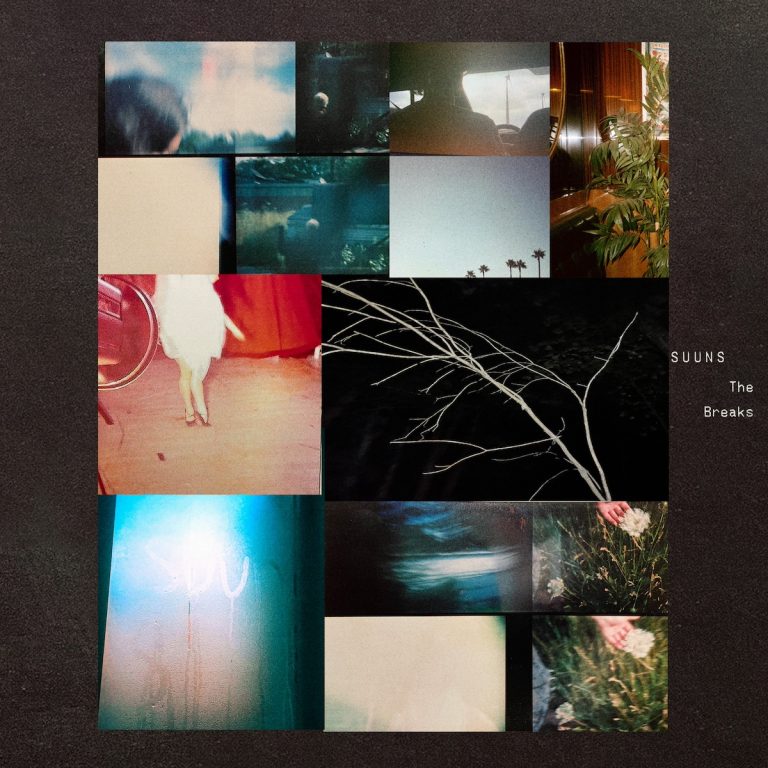Following his trip into the skies, William Shatner described space as “cold, dark, black emptiness”, adding that he was filled with “overwhelming sadness”. He might’ve been responding loosely to the first three albums from Canadian band Suuns, particularly 2016’s Hold/Still. Certainly these works exude sublimity and grandeur, but striking throughout is an iciness, an emotional remove that evokes loneliness, even dejection. Space, if/as conjured in these projects, may possess an austere appeal, but it’s also, at best, indifferent to life; at worst, hostile to human presence.
With their 2020 EP, Fiction, and last LP, 2021’s The Witness, the band kept us, to continue with the metaphor, in outer space; they frequently, however, placed us within a well-furnished ship. If you glanced out the window, you were reminded that you’re floating in a void, but at least within the craft, you could sustain some illusion of being nurtured or supported. This relative warmth was achieved in large part by the band’s ability to draw the listener into what feel like boundaried sonic fields rather than the ever-sprawling and frightful beyond. These last two projects, in contrast to Suuns’ earlier work, offered containment; we may still be dealing with vastness, even unsettling vastness, but at least we weren’t being palpably ignored by infinity.
With their new album, The Breaks, the band attempt to interweave these two trajectories: evoking alienation and forging communality. Most artists reach a pivotal point where they depart from their defaults or strive to reconcile divergent affinities (or, of course, simply repeat themselves). In this sense, The Breaks is Suuns’ most integrated and successfully paradoxical project. It may be a stretch to say that the band have reinvented themselves; then again, yoking contrasting energies into a cogent whole is no minor accomplishment.
“Fish on a String” is built around a relatively conventional beat and vocal. The listener initially thinks they’re being ushered into the American Proto-Pop Theater, Ben Shemie’s vocal landing as a cross between Lou Reed, Bob Dylan and Joey Ramone. Soon, though, the electronics get jankier, quirkier, Shemie’s affect growing flat, as if mid-recording he realized he’s suffering from anxiety and swallowed a double dose of Ativan. Still, as the track inches toward an out-of-body vibe, synthy accents keep the piece grounded, Shemie clinging to his pensive melody. With “Rage”, meanwhile, the band collage a mishmash of accents, 80s-esque synth flourishes, and Shemie’s lurching vocal, bringing to mind a collaboration between Brion Gysin and post-debut MGMT.
With “Overture”, Shemie does his best Dan Bejar impersonation, though in terms of timbre he’s more cold-wave-inflected and lyrically more despair-centric. The band offer protean sounds, occasionally recalling Manchester Orchestra at their more experimental. “Wave” features a line of static, conjuring interruptions in connectivity (Major Tom’s ship is fine, it’s Major Tom we need to worry about). “Don’t wake, don’t breathe, it’s gonna be ok”, Shemie moans. The overall tone of the track, however, suggests that things may be, per Pulp Fiction’s Marcellus Wallace, “pretty fucking far from OK”. As the track progresses, the static and Shemie’s vocal clash more alarmingly. Should we expect a cathartic resolution or a cosmic cum psychic breakdown?
“Road Signs and Meanings” points to Suuns’ foundational absorption of Radiohead, including the British band’s allegiance to classical notions of beauty. As Thom Yorke’s delicate vocals are often stunningly contrasted with earthier, coarse, sometimes mechanistic sonics (even Kid A could be dubbed The Siren in the Cogs), so Shemie’s ephemeral voice is set within swaths of percussion, guitar strums, and synthy overlays. Still, while Yorke’s voice reaches toward the celestial, Shemie’s is reflective, implosive. If Yorke and Radiohead seek and usually find energetic alignments, Shemie and Suuns mostly opt for the slightly off-kilter, discordant, the out-of-synch.
“Doreen” launches as a romantic ode or love song, though we’re quickly left to ponder whether the central character is a masturbatory fantasy, Shemie’s alter ego, some dating-site app reimagined as a life partner, or a goddess the singer can call upon in times of trouble. “The closer I get, the further away”, Shemie laments, his voice dashed by tinkly synths. By song’s end, we’re unsure if we’re in an observation deck staring at a stranger’s corpse or hovering above a crowd at our own funeral. The title song is built around a twitchy beat and dashes of classically oriented string sounds, while Shemie’s vocal tone vacillates between plaintiveness and narcotization.
With The Breaks, we’re still essentially in human vs. the universe mode, Shemie playing the untethered existential traveler, the panoramic background a distinctly non-mammalian cosmos. Suuns still linger around the lip of a massive black hole, inviting us to join them, though there are glimpses of light and redemption. Additionally, Shemie often points to the healing qualities of collectivism (that said, don’t expect a “Kumbaya” singalong anytime soon). He may disagree with various thinkers that the universe is made of love, but perhaps he’s considering that the ability to express this rare energy is indeed what makes humans unique, human life worth experiencing.

